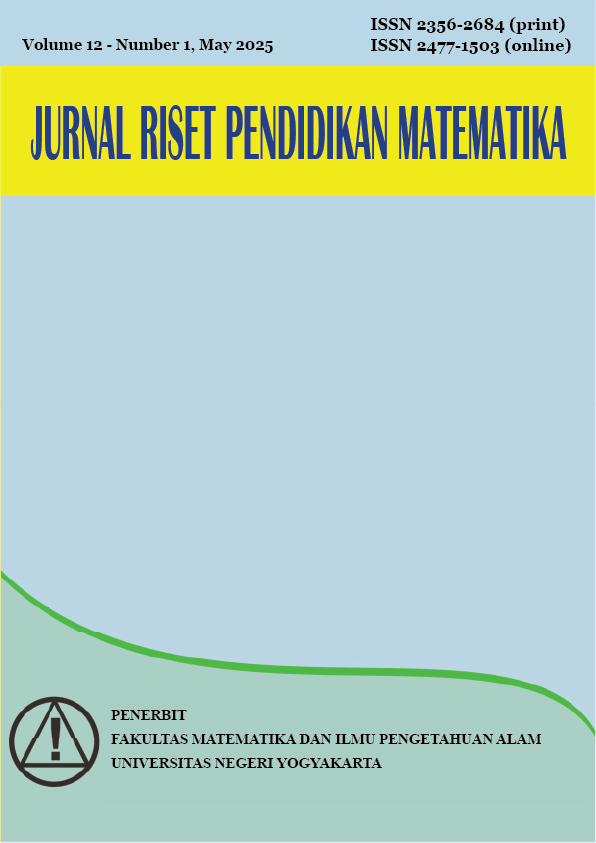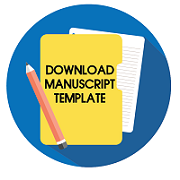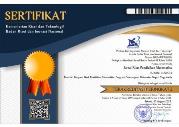Developing Inductive Approach-Based Worksheets for Enhancing Students’ Mathematical Generalization Skills
DOI:
https://doi.org/10.21831/jrpm.v12i1.83409Keywords:
Generalization Skills, Inductive Approach, Development Research, Student WorksheetsAbstract
In the 21st century, the ability to generalize mathematical concepts is crucial for students' cognitive development. However, teaching materials that fail to support the development of this skill can hinder student learning outcomes. Therefore, educators need effective teaching materials that improve students' ability to generalise. This study aims to develop teaching materials based on an inductive approach to improve students' mathematical generalization skills. This research uses the ADDIE model, which consists of five phases: analysis, design, development, implementation and evaluation. The study used student worksheets that had been validated by subject and media experts. In addition, pre- and post-tests were conducted to assess the effectiveness and practicality of the worksheets. The results indicated that the developed student worksheets met the criteria for validity, practicality, and effectiveness. The validity of the worksheets was confirmed through positive evaluations from two material experts and two media experts. Practicality was determined based on the overall positive feedback from students. Finally, the effectiveness of the worksheets was demonstrated by a significant improvement in students' mathematical generalization skills following the intervention.References
Aisyah, A. (2016). Studi literatur: Pendekatan induktif untuk meningkatkan kemampuan generalisasi dan self confident siswa SMK. JP3M (Jurnal Penelitian Pendidikan Dan Pengajaran Matematika), 2(1), 1–12. https://doi.org/10.37058/jp3m.v2i1.148
Anggoro, B. S. (2016). Meningkatkan Kemampuan Generalisasi Matematis Melalui Discovery Learning dan Model Pembelajaran Peer Led Guided Inquiry. Al-Jabar: Jurnal Pendidikan Matematika, 7(1), 11–20. http://dx.doi.org/10.24042/ajpm.v7i1.9663
Aprilita, P., Mirza, A., & Nursangaji, A. (2016). Analisis Kemampuan Generalisasi Matematis Siswa di Kelas VII Sekolah Menengah Pertama. Jurnal Pendidikan Dan Pembelajaran Untan, 5(10), 1–10. https://jurnal.untan.ac.id/index.php/jpdpb/article/view/16777
Baharuddin, Nurul Hasfika Sari, Andi Ika Prasasti Abrar, Fitriani Nur, & Andi Dian Angriani. (2024). Development of Student Worksheets With a Realistic Mathematics Education Approach Set Material Class VII Junior High School. MaPan, 12(1), 64–86. https://doi.org/10.24252/mapan.2024v12n1a5
Basri. (2019). Pengembangan LKPD Matematika Berbasis Masalah Untuk Meningkatkan Pemahaman Konsep Aljabar Siswa di Kelas VII SMP Negeri 2 Marioriwawo Kabupaten Soppeng [Doctoral dissertation]. Universitas Islam Negeri Alauddin.
Branch, R. M. (2009). Instructional Design: The ADDIE Approach. Springer US. https://doi.org/10.1007/978-0-387-09506-6
Brown, S. I., & Walter, M. I. (2005). The Art of Problem Posing (0 ed.). Psychology Press. https://doi.org/10.4324/9781410611833
Bruner, J. S. (1961). The act of discovery. Harvard Education Review, 31(1), 21–32.
Cahyadi, R. A. H. (2019). Pengembangan Bahan Ajar Berbasis Addie Model. Halaqa: Islamic Education Journal, 3(1), 35–42. https://doi.org/10.21070/halaqa.v3i1.2124
Callejo, M. L., & Zapatera, A. (2017). Prospective primary teachers’ noticing of students’ understanding of pattern generalization. Journal of Mathematics Teacher Education, 20(4), 309–333. https://doi.org/10.1007/s10857-016-9343-1
Dani, S., Pujiastuti, H., & Sudiana, R. (2017). Pendekatan Realistic Mathematics Education Untuk Meningkatkan Kemampuan Generalisasi Matematis Siswa. Jurnal Penelitian Dan Pembelajaran Matematika, 10(2), 182–193. https://doi.org/10.30870/jppm.v10i2.2043
De Jong, L., Meirink, J., & Admiraal, W. (2019). School-based teacher collaboration: Different learning opportunities across various contexts. Teaching and Teacher Education, 86, 102925. https://doi.org/10.1016/j.tate.2019.102925
Dewi, A. K., Slamet, S. Y., Atmojo, I. R. W., & Syawaludin, A. (2023). The influence of interactive digital worksheets based on level of inquiry towards science process skills in elementary school. Pegem Journal of Education and Instruction, 13(1), 251–258. https://doi.org/10.47750/pegegog.13.01.27
Dinarti, S. (2022). Analisis strategi siswa sekolah dasar dalam memecahkan masalah generalisasi pola ditinjau dari gaya kognitif. AKSIOMA : Jurnal Matematika Dan Pendidikan Matematika, 13(2), 278–292. https://doi.org/10.26877/aks.v13i2.12517
Fadhila, N. A., Setyaningsih, N. W., Gatta, R. R., & Handziko, R. C. (2022). Pengembangan Bahan Ajar Menggunakan Model Addie Pada Materi Struktur dan Fungsi Jaringan Tumbuhan SMA Kurikulum 2013. BIOEDUKASI (Jurnal Pendidikan Biologi), 13(1), 1–8. https://doi.org/10.24127/bioedukasi.v13i1.5298
Fitrianna, A. Y., Priatna, N., & Dahlan, J. A. (2021). Pengembangan Model E-Book Interaktif Berbasis Pembelajaran Induktif untuk Melatihkan Kemampuan Penalaran Aljabar Siswa SMP. Jurnal Cendekia : Jurnal Pendidikan Matematika, 5(2), 1562–1577. https://doi.org/10.31004/cendekia.v5i2.653
Gerhard, M. (1971). Effective Teaching Strategis with The Behavioral Outcomes Approach. Parker Publishing Company.
Hamzah, H., Tambak, S., & Hayati, M. (2021). Pengembangan Keterampilan Menulis Akademik Mahasiswa: Pengaruh Jenjang Kelas dan Latar Belakang Orang Tua. JKIP : Jurnal Kajian Ilmu Pendidikan, 2(1), 30–35. https://doi.org/10.55583/jkip.v2i1.125
Harel, G., & Tall, D. (1991). The General, the Abstract, and the Generic in Advanced Mathematics. For the Learning of Mathematics. For the Learning of Mathematics, 11(1), 38–42. http://www.jstor.org/stable/40248005
Hayuningrat, S., & Rosnawati, R. (2022). Development of learning tools based on realistic mathematics approach that oriented to high school students’ mathematical generalization ability. Jurnal Riset Pendidikan Matematika, 9(2), 191–200. https://doi.org/10.21831/jrpm.v9i2.52197
Hidayat, A., & Irawan, I. (2017). Pengembangan LKS Berbasis RME Dengan Pendekatan Problem Solving Untuk Memfasilitasi Kemampuan Pemecahan Masalah Matematis Siswa. Jurnal Cendekia : Jurnal Pendidikan Matematika, 1(2), 51–63. https://doi.org/10.31004/cendekia.v1i2.20
Hudojo, H. (2005). Pengembangan Kurikulum dan Pembelajaran Matematika edisi revisi II. Universitas Negeri Malang (UM Press).
Iliana, H. S., Andayani, Y., Supriadi, S., & Burhanuddin, B. (2023). Pengembangan Lembar Kerja Peserta Didik Berpendekatan Saintifik Berbasis Daring Untuk Melatih Penalaran Induktif Siswa pada Materi Asam dan Basa. Chemistry Education Practice, 6(1), 128–134. https://doi.org/10.29303/cep.v6i1.3198
Irsalina, A., & Dwiningsih, K. (2018). Practicality Analysis of Developing the Student Worksheet Oriented Blended Learning in Acid Base Material. JKPK (Jurnal Kimia Dan Pendidikan Kimia), 3(3), 171–182. https://doi.org/10.20961/jkpk.v3i3.25648
Iryani, D., Bistari, B., & Hartoyo, A. (2023). Development of Interpretation for Strengthening Mathematical Thinking Through Worksheets of Learners in Junior High Schools. JPMI (Jurnal Pendidikan Matematika Indonesia), 8(2), 102–109. https://doi.org/10.26737/jpmi.v8i2.4140
Iswara, H. S., Ahmadi, F., & Ary, D. D. (2022). Numeracy Literacy Skills of Elementary School Students through Ethnomathematics-Based Problem Solving. Interdisciplinary Social Studies, 2(2), 1604–1616. https://doi.org/10.55324/iss.v2i2.316
Joyce, B., Weil, M., & Calhoun, E. (2011). Models of Teaching: Model-Model Pengajaran. Edisi Kedelapan (Achmad Fawaid & Ateilla Mirza, penterjemah). Pustaka Pelajar.
Karabulut, A., & Ozmen, E. R. (2019). Effect of "Understand and Solve " Strategy Instruction on Mathematical Problem Solving of Students with Mild Intellectual Disabilities. Lnternational Electronic Journal of Elementary Education, 11(2), 77–90. https://doi.org/10.26822/iejee.2018245314
Kawuri, M. Y. R. T., Ishafit, I., & Fayanto, S. (2019). Efforts To Improve The Learning Activity And Learning Outcomes Of Physics Students With Using A Problem-Based Learning Model. IJIS Edu : Indonesian Journal of Integrated Science Education, 1(2), 105–114. https://doi.org/10.29300/ijisedu.v1i2.1957
Khairiyah, R. S., Ariessanty Alicia Kusuma Wardhani, R. R., & Apriani, H. (2019). Pengaruh Lembar Kerja Siswa (LKS) Berbasis Pendekatan Induktif Terhadap Kemampuan Berpikir Kritis Siswa Pada Materi Kelarutan dan Hasil Kali Kelarutan di SMA Negeri 12 Banjarmasin. Dalton : Jurnal Pendidikan Kimia Dan Ilmu Kimia, 2(1), 11–15. https://doi.org/10.31602/dl.v2i1.1994
Lubis, E. M. S. (2023). Development of E-LKPD Based on Constructivism Assisted by Live Worksheets to Improve Mathematical Ability. Logaritma : Jurnal Ilmu-Ilmu Pendidikan Dan Sains, 11(02), 233–246. https://doi.org/10.24952/logaritma.v11i02.10046
Mudhakir, I., Prayitno, S., & Tyaningsih, R. Y. (2023). Pengembangan Lembar Kerja Peserta Didik Berbasis Inkuiri Terbimbing Materi Barisan Untuk Meningkatkan Kemampuan Pemahaman Matematis. Journal of Classroom Action Research, 5(3), 221–229. https://doi.org/10.29303/jcar.v5i3.5406
Mujizatullah. (2018). Mukhtar Yahya and the Method of Teaching Arabic: The Analysis of Muhadasah Method in the Perspective of Behaviorism Theory. Jurnal Pendidikan Islam, 7(1), 165–184. https://doi.org/10.14421/jpi.2018.71.103-122
Muslimah. (2020). Pentingnya LKPD pada Pendekatan Scientific Pembelajaran Matematika. Workshop Nasional Penguatan Kompetensi Guru Sekolah Dasar, 3, 1471–1479.
Naraswari, T. P., Kusmayadi, T. A., & Fitriana, L. (2023). Students’ Mathematical Generalization in Solving Numeracy Problems. Jurnal Penelitian Dan Pengembangan Pendidikan, 7(3), 533–542. https://doi.org/10.23887/jppp.v7i3.66888
Nicol, A. A., Owens, S. M., Le Coze, S. S., MacIntyre, A., & Eastwood, C. (2018). Comparison of high-technology active learning and low-technology active learning classrooms. Active Learning in Higher Education, 19(3), 253–265. https://doi.org/10.1177/1469787417731176
Nirfayanti, N., & Syamsuriyawati, S. (2024). Pengembangan Model Pembelajaran Kooperatif Tipe Aktif, Kolaborasi, dan Induktif Untuk Meningkatkan Kemampuan Generalisasi Matematika Siswa SMP. De Fermat : Jurnal Pendidikan Matematika, 7(1), 46–60. https://doi.org/10.36277/defermat.v7i1.316
Nurfadhillah, Johar, R., & Ahmad, A. (2018). The quality of learning materials through mathematics reaslitic to improve students’ mathematical communication ability in the elementary school. Journal of Physics: Conference Series, 1088(1), 012077. https://doi.org/10.1088/1742-6596/1088/1/012077
Nurlinda, N., & Nirfayanti, N. (2022). Penerapan Model Pembelajaran Berpikir Induktif Terhadap Hasil Belajar Matematika Siswa SMP. Pedagogy: Jurnal Pendidikan Matematika, 7(1), 96–108. https://doi.org/10.30605/pedagogy.v7i1.1804
OECD. (2023). PISA 2022 Results (Volume I): The State of Learning and Equity in Education. OECD Publishing. https://doi.org/10.1787/53f23881-en
Polya, G. (1945). How to Solve It: A New Aspect of Mathematical Method. Princeton University Press.
Prince, M. J., & Felder, R. M. (2006). Inductive Teaching and Learning Methods: Definitions, Comparisons, and Research Bases. Journal of Engineering Education, 95(2), 123–138. https://doi.org/10.1002/j.2168-9830.2006.tb00884.x
Puspandari, I., Praja, E. S., & Muhtarulloh, F. (2019). Pengembangan Bahan Ajar dengan Pendekatan Induktif untuk Meningkatkan Kemampuan Representasi Matematis Siswa SMP. Mosharafa: Jurnal Pendidikan Matematika, 8(2), 307–318. https://doi.org/10.31980/mosharafa.v8i2.564
Ramdhani, S., Suryadi, D., & Prabawanto, S. (2019). Developing Mathematics Instructional Materials to Enhance Students’ Ability of Making Generalization. Journal of Engineering Science and Technology, Special Issue on AASEC2018, 39–46. https://jestec.taylors.edu.my/Special%20Issue%20on%20AASEC%202018/AASEC_SIS_005.pdf
Rizkiyah, V. N. S., & Rahaju, E. B. (2018). Penalaran Generalisasi Siswa SMP Dalam Memecahkan Masalah Pada Materi Barisan Bilangan Ditinjau Berdasarkan Tipe Kepribadian. MATHEdunesa: Jurnal Ilmiah Pendidikan Matematika, 7(2), 1–10. https://doi.org/10.26740/mathedunesa.v7n2.p406-415
Rochmad. (2007). Proses Berpikir Induktif dan Deduktif dalam Mempelajari Matematika. Kreano: Jurnal Matematika Kreatif-Inovatif, 1(2), 107–117.
Russefendi. (1991). Pengantar kepada Mengembangkan Kompetensi Guru Matematika untuk Meningkatkan CBSA. Tarsito.
Saefurohman, S., Maryanti, R., Azizah, N. N., Husaeni, D. F. A., Wulandary, V., & Irawan, A. R. (2023). Efforts to Increasing Numeracy Literacy of Elementary School Students Through Quiziz Learning Media. ASEAN Journal of Science and Engineering Education, 3(1), 11–18. https://doi.org/10.17509/ajsee.v3i1.38570
Sari, N. W., & Surya, E. (2019). Pembelajaran Berbasis Induksi dan Dampaknya terhadap Pemahaman Matematika. Jurnal Pendidikan Matematika, 10(1), 22–34. https://doi.org/10.22342/jpm.10.1.5686.22-34
Shuriye, A. O., & Daoud, J. I. (2011). Islamic Mathematical Sciences. Australian Journal of Basic and Applied Sciences, 5(3), 51–59.
Sosa Moguel, L. E., Aparicio Landa, E., & Cabañas-Sánchez, G. (2019). Characterization of Inductive Reasoning in Middle School Mathematics Teachers in a Generalization Task. International Electronic Journal of Mathematics Education, 14(3), 563–581. https://doi.org/10.29333/iejme/5769
Suniasih, N. W. (2019). Pengembangan Bahan Ajar Neurosains Bermuatan Pendidikan Karakter Dengan Model InkuirI. Mimbar Ilmu, 24(3), 417–429. https://doi.org/10.23887/mi.v24i3.22542
Tharayil, S., Borrego, M., Prince, M., Nguyen, K. A., Shekhar, P., Finelli, C. J., & Waters, C. (2018). Strategies to mitigate student resistance to active learning. International Journal of STEM Education, 5(1), 1–16. https://doi.org/10.1186/s40594-018-0102-y
Weinberg, P. (2019). Generalizing and Proving in an Elementary Mathematics Teacher Education Program: Moving Beyond Logic. EURASIA Journal of Mathematics, Science and Technology Education, 15(9), 1–15. https://doi.org/10.29333/ejmste/108450
Yuni, Y. (2011). The Influence of Guided Discovery Learning Through Student’s Ability on the Generalization Mathematics at Junior High School. International Seminar and the 4th National Conference on Mathematics Education.
Yusepa, B. (2017). Kemampuan Abstraksi Matematis Siswa Sekolah Menengah Pertama (SMP) Kelas VIII. Symmetry: Pasundan Journal of Research in Mathematics Learning and Education, 1(1), 54–60. https://doi.org/10.23969/symmetry.v1i1.233
Zazkis, R., & Liljedahl, P. (2002). Arithmetic sequence as a bridge among conceptual fields. Canadian Journal of Science Mathematics and Technology Education, 2(1), 91–118.
Downloads
Published
How to Cite
Issue
Section
License
Copyright (c) 2025 Jurnal Riset Pendidikan Matematika

This work is licensed under a Creative Commons Attribution-ShareAlike 4.0 International License.

Jurnal Riset Pendidikan Matematika by http://journal.uny.ac.id/index.php/jrpm/index is licensed under a Creative Commons Attribution-ShareAlike 4.0 International License.









